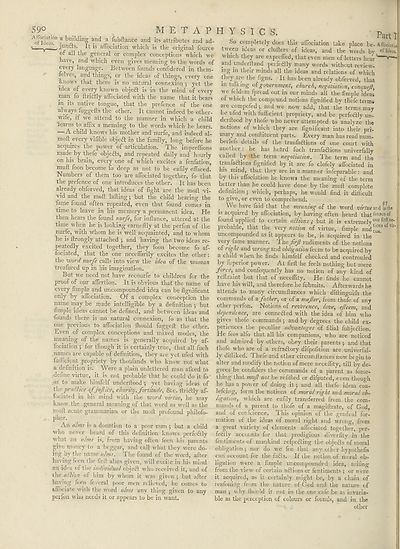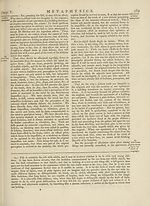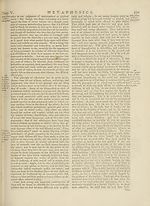Encyclopaedia Britannica, or, a Dictionary of arts, sciences, and miscellaneous literature : enlarged and improved. Illustrated with nearly six hundred engravings > Volume 13, MAT-MIC
(636) Page 590
Download files
Complete book:
Individual page:
Thumbnail gallery: Grid view | List view

S9o M E T A P
? bmld!"g r!nd a fubftance and its attributes and ad-
1 ■ Junfts. It is affociation which is the original fource
of all the general or complex conceptions which we
have, and which even gives meaning to the words of
every language. Between founds confidered in them-
felves, and things, or the ideas of things, every one
knows that there is no natural connexion 5 yet the
idea of every known objeft is in the mind of every
man fo ftrictly affociated with the name that it bears
in its native tongue, that the prefence of the one
always fuggefts the other. It cannot indeed be other-
wife, if we attend to the manner in which a child
learns to affix a meaning to the words which he hears.
—A child knows his mother and nurfe, and indeed al-
moft every vifible objeft in the family, long before he
acquires the power of articulation. The impreffions
made by thefe objefts, and repeated daily and hourly
on his brain, every one of which excites a fenfation,
mull foon become fo deep as not to be ealily effaced.
Numbers of them too are affociated together, fo that
the prefence of one introduces the other. It has been
already obferved, that ideas of light are the moll vi¬
vid and the molt lading j but the child hearing the
lame found often repeated, even that found comes in
time to leave in his memory a permanent idea. He
then hears the found nurfe, for indance, uttered at the
time when he is looking earnedly at the perfon of the
nurfe, with whom he is well acquainted, and to whom
he is drongly attached j and having the two ideas re¬
peatedly excited together, they foon become fo af¬
fociated, that the one neceflarily excites the other:
the word nurfe calls into view the idea of the woman
treafured up in his imagination.
But we need not have recourfe to children for the
proof of our affertion. It is obvious that the name of
every dmple and uncompounded idea can be dgnificant
only by affcciation. Of a complex conception the
name may be made intelligible by a definition j but
dmple ideas cannot be defined, and between ideas and
founds there is no natural connexion, fo as that the
one previous to affociation ffiould fuggeft the other.
Even of complex conceptions and mixed modes, the
meaning of the names is generally acquired by af¬
fociation 5 for though it is certainly true, that all fuch
.names are capable of definition, they are yet ufed with
fufficicnt propriety by thoufands who know not what
a definition is. Were a plain unlettered man alked to
define virtue, it is not probable that he could do it fo
.as to make himfclf underflood ; yet having ideas of
the practice ofjufice, charily, fortitude, &c. llriclly af¬
fociated in his mind with the word virtue, he may
know the general meaning of that word as well as the
moff acute grammarian or the moil profound philofo-
pher.
An alms is a donation to a poor man ; but a child
who never heard of this definition knows perfectly
what an alms is, from having often feen his parents
give money to a beggar, and call what they were do¬
ing by the name alms. The found of the word, after
having feen the firfl alms given, will excite in his mind
an idea of the individual objefl who received it, and of
the alhon of him by whom it was given ; but after
having ften feveral poor men relieved, he comes to
aflociate with the word alms any thing given to any
peifon who needs it or appears to be in want.
HYSICS. PartI
So completely does this affociation take place be- Ailbciatio
tween ideas or chillers of ideas, and the w ords bv of Ideas.
which they are expreffed, that even men of letters hear'
and under ft and perfectly many words without review¬
ing in their minds all the ideas and relations of which
they are the figns. It has been already obferved, that
m talking of government, church, negotiation, conquejl,
we feldom fpread out in our minds all the fimple ideas
of which the compound notions fignified by thefe terms
are compofed 5 and we now add, that the terms may
be ufed with fufficient propriety, and be perfe&ly un-
derftood by thofe who never attempted to analyze the
notions of which they are fignificant into their pri¬
mary and conftituent parts. Every man has read num-
berlefs details of the tranfaflions of one court with
another: lie has hetlrd fuch tranfaflions univerfally
ealled by the term negotiation. The term and the
tranfaflions fignified by it are fo clofely affociated in
his mind, that they are in a manner infeparable: and
by this affociation lie know* the meaning of the term
better than he could have done by the moft complete
definition 5 which, perhaps, he would find it difficult
to give, or even to comprehend.
We have faid that the meaning of the word virtueatd fsfte
is acquired by affociation, by having often heard that^0U),ce
1! 1 • 1 . . . _
found applied to certain aSiions ; but it is extremely ourf‘rftno'
probable, that the very notion of virtue, fimple and °f W‘
uncompounded as it appears to be, is acquired in the
very fame manner. The frf rudiments of the notions
of right and wrong and obligation feem to be acquired by
a child when he finds himfelf checked and controuled
by fuperior power. At firfl he feels nothing but mere
force,. and confequcntly has no notion of any kind of
reflraint but that of rieceffity. He finds he cannot
have his will, and therefore he fubmits. Afterwards he
attends to many circumflances which diflinguifh the
commands of n father, or of a majler, from thofe of any
other perfon. Notions of reverence, love, efeem, and
dependence, are connedled with the idea of him who
gives thofe commands; and by degrees the child ex¬
periences the peculiar advantages of filial fubjeflion.
He fees alfo that all his companions, who are noticed
and admired by others, obey their parents} and that
thofe who are of a refraftory difpofition are univerfal¬
ly difliked. Thefe and other circumilances now begin to
alter and modify the notion of mere neceffity, till by de¬
grees he confiders the commands of a parent as fbme-
thing that mujl not be refilled or difputed, even though
he has a power of doing it 5 and all thefe ideas coa-
lefcing, form the notions of moral right and moral ob¬
ligation, which are eafily transferred from the com¬
mands of a parent to thofe of a magiftrate, of God,
and of confcience. This opinion of the gradual for¬
mation of the ideas of moral right and wrong, from
a great variety of elements affociated together, per-
feftly accounts for that prodigious diverfity in the
fentiments of mankind refpefting the objedts of moral
obligation ; nor do we fee that any other hypothefis
can account for the faffs. If the notion of moral ob¬
ligation were a fimple uncompounded idea, arifing
from the view of certain aflions or fentiments ; or were
it acquired, as it certainly might be, by a chain of
reafoning from the nature of God and the nature of
man ; why fhould it not in the one cafe be as invaria¬
ble as the perception of colours or founds, and in the
other
? bmld!"g r!nd a fubftance and its attributes and ad-
1 ■ Junfts. It is affociation which is the original fource
of all the general or complex conceptions which we
have, and which even gives meaning to the words of
every language. Between founds confidered in them-
felves, and things, or the ideas of things, every one
knows that there is no natural connexion 5 yet the
idea of every known objeft is in the mind of every
man fo ftrictly affociated with the name that it bears
in its native tongue, that the prefence of the one
always fuggefts the other. It cannot indeed be other-
wife, if we attend to the manner in which a child
learns to affix a meaning to the words which he hears.
—A child knows his mother and nurfe, and indeed al-
moft every vifible objeft in the family, long before he
acquires the power of articulation. The impreffions
made by thefe objefts, and repeated daily and hourly
on his brain, every one of which excites a fenfation,
mull foon become fo deep as not to be ealily effaced.
Numbers of them too are affociated together, fo that
the prefence of one introduces the other. It has been
already obferved, that ideas of light are the moll vi¬
vid and the molt lading j but the child hearing the
lame found often repeated, even that found comes in
time to leave in his memory a permanent idea. He
then hears the found nurfe, for indance, uttered at the
time when he is looking earnedly at the perfon of the
nurfe, with whom he is well acquainted, and to whom
he is drongly attached j and having the two ideas re¬
peatedly excited together, they foon become fo af¬
fociated, that the one neceflarily excites the other:
the word nurfe calls into view the idea of the woman
treafured up in his imagination.
But we need not have recourfe to children for the
proof of our affertion. It is obvious that the name of
every dmple and uncompounded idea can be dgnificant
only by affcciation. Of a complex conception the
name may be made intelligible by a definition j but
dmple ideas cannot be defined, and between ideas and
founds there is no natural connexion, fo as that the
one previous to affociation ffiould fuggeft the other.
Even of complex conceptions and mixed modes, the
meaning of the names is generally acquired by af¬
fociation 5 for though it is certainly true, that all fuch
.names are capable of definition, they are yet ufed with
fufficicnt propriety by thoufands who know not what
a definition is. Were a plain unlettered man alked to
define virtue, it is not probable that he could do it fo
.as to make himfclf underflood ; yet having ideas of
the practice ofjufice, charily, fortitude, &c. llriclly af¬
fociated in his mind with the word virtue, he may
know the general meaning of that word as well as the
moff acute grammarian or the moil profound philofo-
pher.
An alms is a donation to a poor man ; but a child
who never heard of this definition knows perfectly
what an alms is, from having often feen his parents
give money to a beggar, and call what they were do¬
ing by the name alms. The found of the word, after
having feen the firfl alms given, will excite in his mind
an idea of the individual objefl who received it, and of
the alhon of him by whom it was given ; but after
having ften feveral poor men relieved, he comes to
aflociate with the word alms any thing given to any
peifon who needs it or appears to be in want.
HYSICS. PartI
So completely does this affociation take place be- Ailbciatio
tween ideas or chillers of ideas, and the w ords bv of Ideas.
which they are expreffed, that even men of letters hear'
and under ft and perfectly many words without review¬
ing in their minds all the ideas and relations of which
they are the figns. It has been already obferved, that
m talking of government, church, negotiation, conquejl,
we feldom fpread out in our minds all the fimple ideas
of which the compound notions fignified by thefe terms
are compofed 5 and we now add, that the terms may
be ufed with fufficient propriety, and be perfe&ly un-
derftood by thofe who never attempted to analyze the
notions of which they are fignificant into their pri¬
mary and conftituent parts. Every man has read num-
berlefs details of the tranfaflions of one court with
another: lie has hetlrd fuch tranfaflions univerfally
ealled by the term negotiation. The term and the
tranfaflions fignified by it are fo clofely affociated in
his mind, that they are in a manner infeparable: and
by this affociation lie know* the meaning of the term
better than he could have done by the moft complete
definition 5 which, perhaps, he would find it difficult
to give, or even to comprehend.
We have faid that the meaning of the word virtueatd fsfte
is acquired by affociation, by having often heard that^0U),ce
1! 1 • 1 . . . _
found applied to certain aSiions ; but it is extremely ourf‘rftno'
probable, that the very notion of virtue, fimple and °f W‘
uncompounded as it appears to be, is acquired in the
very fame manner. The frf rudiments of the notions
of right and wrong and obligation feem to be acquired by
a child when he finds himfelf checked and controuled
by fuperior power. At firfl he feels nothing but mere
force,. and confequcntly has no notion of any kind of
reflraint but that of rieceffity. He finds he cannot
have his will, and therefore he fubmits. Afterwards he
attends to many circumflances which diflinguifh the
commands of n father, or of a majler, from thofe of any
other perfon. Notions of reverence, love, efeem, and
dependence, are connedled with the idea of him who
gives thofe commands; and by degrees the child ex¬
periences the peculiar advantages of filial fubjeflion.
He fees alfo that all his companions, who are noticed
and admired by others, obey their parents} and that
thofe who are of a refraftory difpofition are univerfal¬
ly difliked. Thefe and other circumilances now begin to
alter and modify the notion of mere neceffity, till by de¬
grees he confiders the commands of a parent as fbme-
thing that mujl not be refilled or difputed, even though
he has a power of doing it 5 and all thefe ideas coa-
lefcing, form the notions of moral right and moral ob¬
ligation, which are eafily transferred from the com¬
mands of a parent to thofe of a magiftrate, of God,
and of confcience. This opinion of the gradual for¬
mation of the ideas of moral right and wrong, from
a great variety of elements affociated together, per-
feftly accounts for that prodigious diverfity in the
fentiments of mankind refpefting the objedts of moral
obligation ; nor do we fee that any other hypothefis
can account for the faffs. If the notion of moral ob¬
ligation were a fimple uncompounded idea, arifing
from the view of certain aflions or fentiments ; or were
it acquired, as it certainly might be, by a chain of
reafoning from the nature of God and the nature of
man ; why fhould it not in the one cafe be as invaria¬
ble as the perception of colours or founds, and in the
other
Set display mode to:
![]() Universal Viewer |
Universal Viewer | ![]() Mirador |
Large image | Transcription
Mirador |
Large image | Transcription
Images and transcriptions on this page, including medium image downloads, may be used under the Creative Commons Attribution 4.0 International Licence unless otherwise stated. ![]()
| Permanent URL | https://digital.nls.uk/192692313 |
|---|
| Attribution and copyright: |
|
|---|
| Description | Ten editions of 'Encyclopaedia Britannica', issued from 1768-1903, in 231 volumes. Originally issued in 100 weekly parts (3 volumes) between 1768 and 1771 by publishers: Colin Macfarquhar and Andrew Bell (Edinburgh); editor: William Smellie: engraver: Andrew Bell. Expanded editions in the 19th century featured more volumes and contributions from leading experts in their fields. Managed and published in Edinburgh up to the 9th edition (25 volumes, from 1875-1889); the 10th edition (1902-1903) re-issued the 9th edition, with 11 supplementary volumes. |
|---|---|
| Additional NLS resources: |
|

